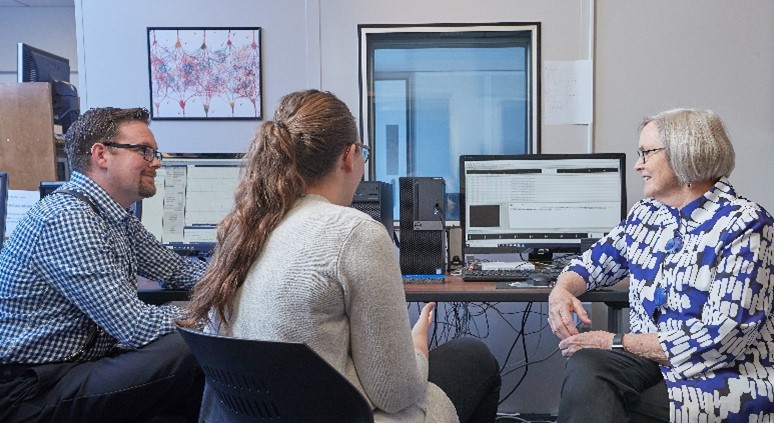Graduate School
The Importance of Mentoring in Graduate School and How to Choose a Good Mentor
 Graduate school is often described as one of the most transformative stages of academic
and professional life. It is a time when students delve deeply into their chosen fields,
engage with complex ideas, and prepare for future careers, either in academia or industry.
However, this journey can also be fraught with challenges, uncertainty, and moments
of self-doubt. Having a strong mentor can make a significant difference in navigating
these challenges and achieving success. Typically, in a PhD program your mentor will
be your dissertation director. At the master’s level your mentor might be the chair
of your thesis committee, or an academic advisor. Mentoring in graduate school can
occur outside of these roles as well. For instance, for students preparing for the
professoriate, you may have a teaching mentor as well as a dissertation director.
Because of the multidimensional nature of human beings, graduate students may need
to find more than one mentor to support them in their graduate school journey.
Graduate school is often described as one of the most transformative stages of academic
and professional life. It is a time when students delve deeply into their chosen fields,
engage with complex ideas, and prepare for future careers, either in academia or industry.
However, this journey can also be fraught with challenges, uncertainty, and moments
of self-doubt. Having a strong mentor can make a significant difference in navigating
these challenges and achieving success. Typically, in a PhD program your mentor will
be your dissertation director. At the master’s level your mentor might be the chair
of your thesis committee, or an academic advisor. Mentoring in graduate school can
occur outside of these roles as well. For instance, for students preparing for the
professoriate, you may have a teaching mentor as well as a dissertation director.
Because of the multidimensional nature of human beings, graduate students may need
to find more than one mentor to support them in their graduate school journey.
Why Mentoring is Crucial in Graduate School
1.Guidance on Academic Development
Graduate school is more than just completing coursework and research; it involves
mastering the intellectual and professional norms of a discipline. A mentor serves
as a guide, helping students refine their research skills, navigate academic literature,
and develop the intellectual rigor needed to succeed in their field. Mentors can also
offer advice on structuring a dissertation, managing time effectively, and staying
focused on long-term goals.
When asked "How did your passion impact your area(s) of study?", Christopher Harris, a UofM Ph.D. student in Communication and Rhetoric with a focus on African American (religious) rhetoric and current GSA President, shared: "Because I'm passionate about seeing people live their best lives and helping and being present with people as needed, I came to the UofM to pursue my Ph.D. Under the mentorship of Dr. Andre Johnson, this focus is guided by an interdisciplinary framework that (re)imagines discourses in theology, sociology, and cultural theory." Harris’s experience highlights the pivotal role mentors play in shaping and guiding a student’s academic journey, fostering a deeper connection between passion and scholarly pursuit.
2. Career Advancement and Networking
One of the most critical aspects of a mentor-mentee relationship is the mentor's role
in fostering career development. Whether a student is aiming for an academic position
or seeking opportunities in industry, a mentor can provide valuable advice on career
pathways, help with professional development, and offer introductions to key figures
in the field. Networking opportunities provided by mentors can open doors that might
otherwise remain closed, making it easier for graduate students to find post-graduate
employment or research positions.
3. Emotional and Psychological Support
Graduate school can be stressful, with the pressures of research, publishing, and
navigating complex social and institutional dynamics. A good mentor provides not only
academic support but also emotional encouragement. They can help mentees cope with
the inevitable setbacks and challenges, providing reassurance and helping them maintain
confidence and resilience. Mentors who offer compassionate guidance can play a significant
role in maintaining the mental well-being of graduate students.
4. Fostering Independence
While mentors guide their mentees, one of the goals of mentoring is to foster independence.
A good mentor teaches students how to become self-sufficient researchers, guiding
them to make informed decisions about their research and career paths. This balance
between support and autonomy is crucial for personal and professional growth during
graduate training.
UofM Faculty's Commitment to Mentorship
At the University of Memphis, our faculty's dedication to mentoring graduate students is truly unwavering. This commitment was highlighted in May 2024 when we celebrated the Graduate Student Association (GSA) Mentor Award Recipients. These eight outstanding faculty members, nominated anonymously by their students, were recognized for their exceptional support and guidance, consistently going above and beyond as mentors. You can read our feature in the May 2024 blog edition HERE.
How to Choose a Good Mentor 
Choosing the right mentor is essential to making the most of your graduate school experience. Here are some key factors to consider:
1. Research Alignment
One of the most important factors in selecting a mentor is ensuring that their research
interests align with your own. While some students enter graduate school with a clear
idea of their research goals, others may take time to discover their passions. In
either case, it's important to find a mentor whose expertise and interests complement
your own. This alignment is crucial for fostering productive collaboration and for
receiving relevant guidance on your research.
2. Mentoring Style
Every mentor has a different style of working with students. Some are hands-on, meeting
regularly to discuss progress and provide feedback, while others take a more hands-off
approach, allowing students to work independently and only stepping in when necessary.
It's important to reflect on your own learning style and needs. Are you someone who
benefits from frequent check-ins, or do you prefer more autonomy? When meeting potential
mentors, ask them about their mentoring style and expectations to ensure that it aligns
with your preferences.
For example, Dr. Bentuo Zheng, a UofM faculty member in the Department of Mathematical Sciences and recipient of the 2024 GSA Mentorship Award, is known for his balanced approach.
He emphasizes both guidance and independent growth, making sure to tailor his mentoring
style to each student’s unique needs. You can read more about his mentorship philosophy
and his award in our full feature HERE.
3. Reputation and Track Record
A mentor’s reputation within their field and their track record with previous students
can provide insight into their effectiveness. Are their former students successful
in securing academic or industry positions? How quickly do their students progress
through their programs? These factors can give you a sense of whether a mentor will
be able to provide you with the guidance and opportunities you need to succeed. It
can be helpful to talk to current or former students to gain a clearer picture of
what working with a particular mentor is like.
4. Availability and Accessibility
No matter how knowledgeable or respected a potential mentor is, they need to be available
and accessible to their mentees. Some faculty members have numerous commitments, such
as administrative roles or heavy teaching loads, that limit the amount of time they
can dedicate to mentoring. Before committing to a mentor, ensure that they have the
time and willingness to engage with you regularly and provide the support you need.
5. Personal Compatibility
A good mentor-mentee relationship is built on mutual respect and trust. While professional
compatibility is critical, personal compatibility also matters. Consider whether the
mentor’s communication style works well for you and if you feel comfortable discussing
challenges openly with them. A good mentor should be approachable, supportive, and
genuinely invested in your success.
6. Diversity and Inclusion
For underrepresented groups in academia, finding a mentor who understands the unique
challenges they may face is particularly important.
Mentoring is a vital component of success in graduate school. The right mentor not only provides academic guidance but also helps students navigate the complexities of their personal and professional development. Choosing a mentor requires careful consideration of research alignment, mentoring style, accessibility, and personal compatibility. A well-chosen mentor can have a profound impact on a student’s academic journey, offering the support, insight, and connections that will help them thrive during and after their graduate experience. In turn, this relationship fosters the growth of the next generation of scholars and professionals, ensuring the continuation of knowledge and innovation in their field.
Curious to learn more about mentorship? Don’t miss our upcoming webinar, "Navigating Mentorship: A Guide for Graduate Students," on Wednesday, November 20th, from 11:15 AM to 12:15 PM CST via Teams. Join guest speaker Dr. Kurt Kraiger, Chair and Professor of the Department of Management at the University of Memphis, as he shares insights on building a strong mentor relationship, setting clear expectations, handling feedback, and becoming a proactive mentee. Whether you’re just starting out in grad school or aiming to enhance your mentor-mentee relationship, this session will offer valuable tips and strategies. Register HERE! You don't want o miss this insignful webinar!
Article by the University of Memphis Graduate School in October 2024
